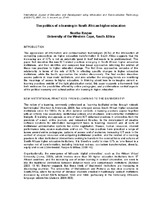The politics of e-learning in South African higher education
Abstract
Introduction: The appearance of information and communication technologies (ICTs) at the intersection of
competing perspectives on higher education transformation in South Africa suggests that the
increasing use of ICTs is not an automatic ‘good in itself’ but needs to be problematised. This
paper first describes the new ICT-related practices emerging in South African higher education
institutions, and then identifies and compares four broad approaches informing the relation of
these new practices to higher education change. The first three approaches conceive of this
relationship in terms of the role of ICTs in effecting specific changes in higher education
institutions, while the fourth approaches the relation discursively. The final section describes
access patterns in ‘dual-mode’ institutions, and asks whether the emerging trends are redefining
the meanings of access to higher education. In thinking about how to re-imagine current elearning
practices outside of the tight globalisation script, this paper supports a framework that
both embraces the possibilities offered by online pedagogies, and problematises central aspects
of the political economy and cultural politics of e-learning in higher education.

